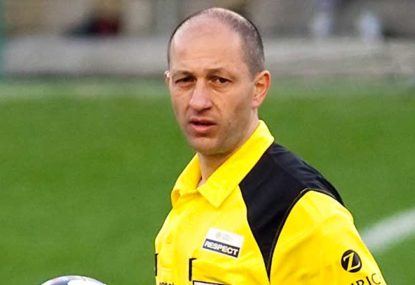Multi-club ownership model: The good, the bad and the ugly behind football's newest structural trend
The real concern comes down to football's growing trend of big corporations taking up slices of the world game at the expense of smaller teams.

Referee Strebre Delovski made a couple of game-changing howlers and it’s all anybody can talk about after the 3-3 draw between Sydney FC and Melbourne Victory.
Both coaches blasted Delovski in the aftermath. Well-respected TV pundits, led by Mark Bosnich, screamed about a lack of accountability and a need to appoint full-time A-League referees.
Yeah, whatever.
I am a football referee. I have been refereeing for well over a decade and have reached a reasonable level, not quite Delovski’s, but I do get irritated when I see the same criticism rolled out after a referee’s mistake.
I’m not defending Delovski’s decisions. He made two shockers which altered the result of the match. I’ll leave the defending to those referees who prefer to believe that the referee is never wrong and at worst can always justify a questionable (or clearly incorrect) decision. Unfortunately, some such referees do exist.
My first problem is the claim, usually made by coaches and often by Bosnich-esque pundits, that referees aren’t accountable for their performances.
Delovski didn’t referee the week after his mistakes. Just like an under-performing player, he was dropped. Referees at that level are watched by an assessor on the day and the video of their game is reviewed by another assessor. Performance is a big part of the appointment process. Referees have KPIs. A number of officials over the years have been punished by not getting games after making high-profile errors. The clubs know this.
So is being dropped not enough? What is an acceptable level of ‘accountability’? Do we need press releases or news reports that a referee has been benched after a clanger? Well, that’s already happened. What more can be done, short of going down the NRL’s path and sacking the referees’ coach seemingly every year? Probably very little. Maybe the ‘no accountability’ claim is just an easy scapegoat.
My second problem is the belief that making the A-League referees full-time will instantly fix everything. Will it help with preparation, focus and education – of course. Will it fix everything – no.
Again, let’s look at the NRL, which has increased both the number of full-time match officials and the number officiating on each game. They now have two refs, two touch judges and two video refs. All game-day referees are full-timers. Howlers are still being made and the officials attract more criticism than ever. The English Premier League also has full-time referees, and mistakes are still being made.
These leagues can justify investing in full-time match officials because the money is there, but in football in Australia it just isn’t; and the chasing perfection when it’s proven to be unattainable is not worth the investment. It would cost at least a million dollars a year to have 10 full-time referees in the A-League, and that doesn’t include assistants, whose decisions can be just as crucial to the outcome of a match.
Even if the money was there, would $100,000 a year be enough to entice 10 referees to walk away from their careers for the sake of a one-year refereeing contract? Because any longer a term would mean there is no accountability.
Like sport itself, refereeing is prone to human error. It cannot be eradicated. Throwing money at the referees will not make them get every big decision right. In the heat of the moment, mistakes are always a chance.
Is it possible that the refereeing is not ‘worse than ever’, as is commonly claimed, but that we see the most recent mistakes as the worst because they are fresh in the memory?
Whatever the case, sometimes we need to accept the un-perfectible, especially in sport, for its imperfections are what makes it so great.